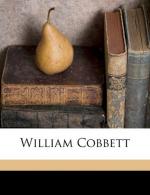|
This section contains 3,522 words (approx. 12 pages at 300 words per page) |

|
SOURCE: "William Cobbett," in The New Review, Vol. 9, No. 54, November 1893, pp. 482-93.
Stephen is considered one of the most important English literary critics of the late Victorian and early Edwardian era. In his criticism, which was often moralistic, he argued that all literature is nothing more than an imaginative rendering, in concrete terms, of a writer's philosophy or beliefs. It is the role of criticism, he contended, to translate into intellectual terms what the writer has told the reader through character, symbol, and plot. In the following excerpt, Stephen provides an overview of Cobbett's beliefs regarding numerous social issues.
Cobbett somehow or other fought through his troubles; brought up his family; heartily enjoyed life till the end; and was even regarded with a certain tolerance by his opponents. They did not take him quite seriously, and thought that his rough abuse was after all the cover of a...
|
This section contains 3,522 words (approx. 12 pages at 300 words per page) |

|


